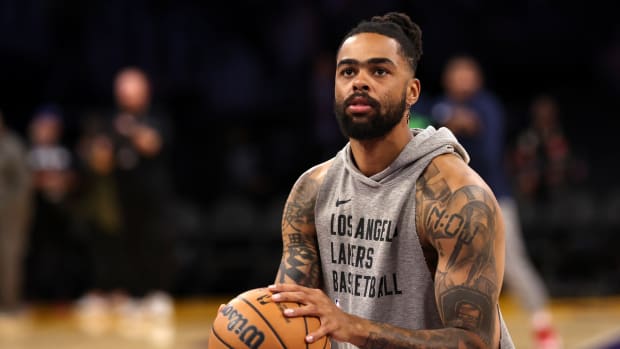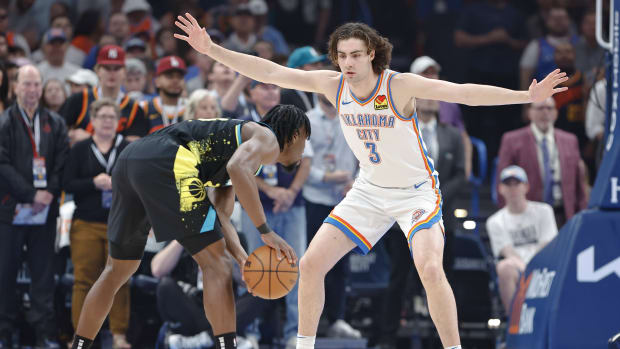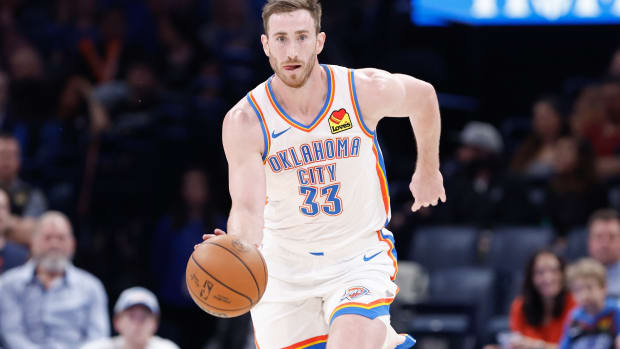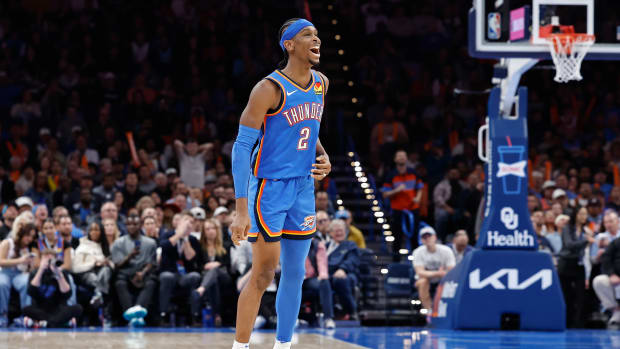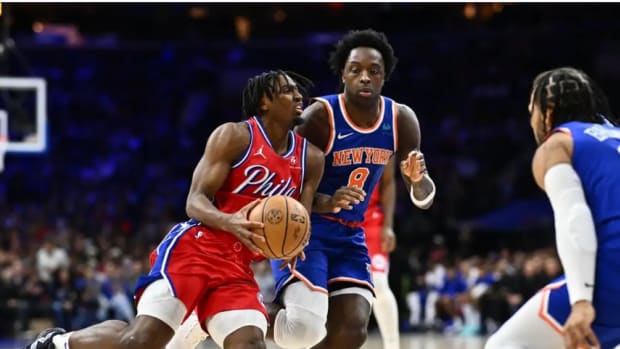Mike Breen Q&A: Michael Jordan at MSG and 'The Last Dance'
Mike Breen is the lead broadcaster for the NBA on ABC. For the past 14 years, he has been the voice of the NBA Finals, calling play-by-play for more Finals games on network television than any other commentator in league history.
The New York native has been calling NBA games for 28 seasons and got his start on the radio, calling Knicks games for WFAN before replacing Marv Albert as the lead voice on the MSG Network.
Approaching his third decade in pro basketball, Breen has witnessed nearly every moment imaginable, from breathtaking to gut-wrenching, including calling the “Malice in the Palace” brawl between the Pacers and Pistons in 2004. And despite calling NBA Finals games featuring Kobe Bryant, LeBron James, Kevin Durant and Kevin Garnett, he has never encountered another star quite like Michael Jordan.
Breen spoke with Sports Illustrated to discuss his history of calling Jordan’s games at Madison Square Garden, offered his insight on beloved Knicks player and Bulls coach Phil Jackson, and shared his take on The Last Dance documentary.
***
Justin Barrasso: Starting with the Knicks and now nationally for ABC, you have been calling NBA games for 28 seasons, so you’ve obviously witnessed some of the league’s most memorable moments, including the Michael Jordan era. What stood out most to you about calling a game that featured Jordan?
Mike Breen: You knew you were watching greatness. You knew were going to get his best, no matter if it was an early season game in November or a game that didn’t matter in the standings right before the playoffs in April.
I remember when I first saw him live, and what stuck out was how hard he played every second of the game, and that included the defensive end. He had so much of a scoring responsibility, and he was still a terrific defender as he got get older but, early in his career, he was as good a perimeter defender as I’d ever seen. Combine that with the magnificence on offensive in terms of athleticism and skill and creativity, it was just the complete package.
Barrasso: The Bulls and the Knicks were a legitimate, heated rivalry, though it never reached the level of disdain or disgust on display from the Bulls-Pistons slugfests. Did beating New York mean more to Jordan because it was his chance to knock off Pat Riley, who had enjoyed incredible success coaching the Lakers in the decade prior, or did he just take special pride in beating Patrick Ewing?
Breen: Michael took special pride in beating everyone. I don’t think he had a specific vendetta or challenge to beat Riley, and he was friends with Patrick Ewing and wanted to beat him, but I don’t think it was anything specific to those two. It was all about beating New York and getting another championship.
Ironically, the rivalry was heated, but there was more back-and-forth in the press between Phil Jackson and Pat Riley than there were the players. It was always interesting back in those days the way the coaches could slam the officiating and lobby for better calls in between games of a playoff series. They often didn’t get fined, but coaches can’t do that now.
There were still some hard feelings, but you’re right, it was nothing like the Pistons and the Bulls. There was a respect factor because of how hard the Knicks played and how good they were, though they just weren’t good enough. Jordan, frequently during that time, said some really nice things about the Knicks and how much he respected them. That may have taken a little off the edge, though if you remember, Jeff Van Gundy got in trouble because he at one time called Jordan a con man. He didn’t mean it as a slight to Jordan. He meant it more as a slight toward his team, as in, "Hey, he comes up and puts his arm around you and he’s your friend? He’s just conning you because he’s just going to destroy you on the court." That became a big issue one year in the playoffs.
Barrasso: Even though he was coaching the Bulls, did the crowd in New York have a special affinity toward Phil Jackson following his success as a player on the Knicks?
Breen: Phil was always beloved by Knick fans because he was part of two championship teams. Now one of them he didn’t play in the playoffs, but he was still part of that team. It’s not like they were rooting for him to win when he was coaching Chicago, but anybody that played on the ’70 or ’73 Knicks teams was always adored. Since he was a member of those championship clubs, he never took the heat from Knicks fans.
Barrasso: Your preparation for games is a big piece of what has made you such a successful broadcaster. Would you prepare any differently when Jordan was coming to Madison Square Garden?
Breen: You really don’t prepare for any game any differently, and you shouldn’t. There were certain games when there is a great player, whether it’s Jordan or LeBron James or Tim Duncan, and you’ve called so many games of their career.
For me, the only way I’d prepare differently was to try and think of different ways to talk about their greatness. You can’t just keep saying the same thing over and over again. When you call a great player, and you’re putting their greatness in perspective, sometimes you have to mix it up and find different ways to describe that.
In terms of the game preparation, I prepare each game the same way, though I might focus on one of those special players a little bit more because, a majority of the time, you’re going to be talking about them.
Barrasso: Was there ever any serious discussion that you can recall of Magic Johnson signing with the Knicks and playing for Pat Riley in 1996?
Breen: That was a rumor, but quite frankly, there is always a rumor about some great player or some great coach coming to the Knicks. Because of the high volume of people covering the team, trying to always find different ways to come up with stories, there always seemed to be some rumor about someone coming to the Knicks. Magic is one of them, but I don’t think it was ever taken too seriously.
Barrasso: The Knicks had their best chance to eliminate Jordan’s Bulls in ’93 when they had home court in the Eastern Conference finals and jumped out to a two-game lead to open the series. Game 5 was particularly painful for the Knicks, as home court was lost after Jordan and Scottie Pippen took turns swatting Charles Smith’s attempts at a game-winner. What was your reaction to that play?
Breen: I was doing radio at the time, and the Garden was going nuts, the roof was about to blow off. Then it turned into absolute, utter deflation.
That’s as deflated as I can ever remember a crowd. The Knicks were so good that year, and if Charles Smith is able to score there and they go up three games to two, there is no guarantee that they’re going to win the series, but it’s at least coming back to the Garden for a game seven.
It was just so deflating. I remember saying, "I’ve got to see a replay! He had to get fouled!" And there was contact on certainly one, maybe two, of them, but it was also a great defensive play. That’s what I remember. The crowd going to the highest possible level and then falling to absolute, utter despair.
Barrasso: Radio is so unique because no one can see the action, so it falls on your shoulders to bring the play to life, especially that particular play.
Breen: I really do miss calling games on the radio. I love doing TV too, obviously, but with radio, you’re in charge of painting the picture to the listeners. It’s a great responsibility, and fortunately growing up, I listened to a lot of great radio announcers. For me, doing the radio was really fun. I love TV, but to this day, I still miss doing radio. I think it’s harder than doing TV play-by-play.
Barrasso: Were you courtside when you were calling the games on radio at the Garden?
Breen: At the Garden, it was probably the best radio booth location in the whole NBA. It was before they refurbished it, and they had the tunnel where Willis Reed came out, the famous tunnel where the teams came out, and it was right above that. It was about 10 rows up and still close enough up where you felt like you were part of the action. At the same time, you were high enough where you could see the entire court. Sometimes when you’re courtside doing radio, you get blocked out or there are angles that were difficult to see. This was a magnificent broadcast location.
Barrasso: I feel like I’m setting up a court case with this next question. With your view of the 1994 Eastern Conference semifinals, did Scottie Pippen foul Hubert Davis in the closing moments of Game 5?
Breen: I will go to my grave saying that was a foul. I will also admit that there may be some lack of objectivity in my belief.
In today’s game, you’re always seeing those foul calls when a player releases the shot and the defender lands into the landing area of the jump shooter. To me, that was the same principal. Scottie Pippen made a good play, but the only way he could distract Hubert Davis from taking that shot was to get into his landing area and make the contact. Yes, I think it was a foul.
Barrasso: I always found it fitting that Hubert Davis went to North Carolina. That Jordan shadow never escaped Pippen, regardless of his brilliance on the basketball court.
Breen: Michael Jordan held a shadow over the entire league. Playing with Jordan elevated Pippen, but Jordan doesn’t win championships without Pippen. And that year in ’94, Pippen was just magnificent.
So much of The Last Dance documentary is made of Pippen’s contract, and certainly he wasn’t paid accordingly to where his stature was in the league. But his respect from coaches, players, and the media was extremely high. Pippen was a great player. He is the best help defender I’ve ever seen. Pippen could dominate a game defensively like very few others because of his athleticism and length, and his defensive instincts were just off the charts.
There were not too many players in the history of the NBA that had the impact he had defensively night in and night out. Some guys don’t like to play defense, but you could tell Pippen relished it.
Barrasso: This week’s episodes of The Last Dance will explore Jordan’s time playing Minor League Baseball. But he returns to the Bulls in March of ’95 and, in only his fifth game back, drops 55 points on the Knicks at Madison Square Garden. Adding to that moment was the Bulls winning when Jordan passed out of a Ewing-Starks double team to hit Bill Wennington for his first and only hoop of the game. What do you remember from Jordan’s return to the Garden in the “Double Nickel” game?
Breen: The hype of Michael being back at the Garden was off the charts. I remember the fans got there so early to watch him come out of the tunnel and warm up. You’ve heard the cliché, "It’s electric in here." Well, it was electric in there prior to the game.
He had put up decent numbers in his first couple games back, yet he wasn’t terribly efficient. But Jordan always loved playing at the Garden, and he beat the Knicks and broke their hearts again. And it was ironic on a night where he scored 55, the game was won with his pass. Jordan’s No. 1 agenda, every single night, was to win.
Barrasso: What has surprised you most about The Last Dance?
Breen: The coolest part is all this behind-the-scenes stuff that nobody knew. Because social media wasn’t around, none of that got out. It’s been incredible to see how difficult life was under that spotlight. But my favorite part of it has been watching with my children. They love the NBA, and they’ve heard me talk about Jordan, but they were too young to remember him playing. We’re all riveted by this documentary, and they’re getting a real feel of his greatness on the court and what he meant to the league. And they’re not the only ones. The whole younger generation is getting an unbelievable chance to experience what Michael Jordan was all about.
Justin Barrasso can be reached at JBarrasso@gmail.com. Follow him on Twitter @JustinBarrasso.































